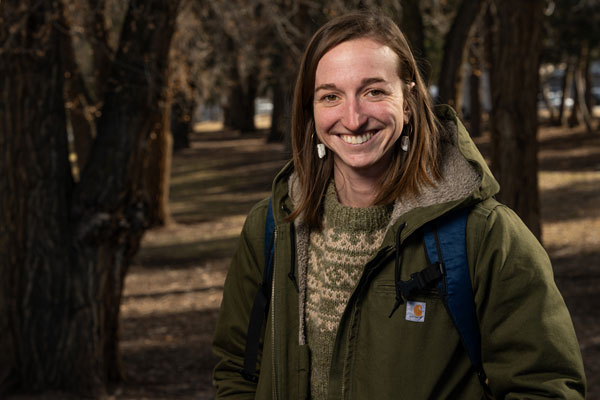UM Student Bridges Conservation and Community Through Master’s Program

MISSOULA – Meg Euclide credits her deep-rooted passion for wildlife and ecosystems to countless backpacking and fishing excursions out West alongside her father. Now she is carving out a career for herself in conservation inspired by those cherished experiences.
Euclide is one of just three graduate students at UM pursuing a professional master’s degree in wildlife biology. The two-year program includes a unique blend of coursework and hands-on experience, and unlike traditional thesis-based programs, students complete a professional paper. This paper is not just an academic exercise, but a tangible contribution to the field of wildlife conservation.
In May, Euclide will be the first to graduate from the UM professional master’s program in wildlife biology.
After finishing her bachelor’s degree in environmental science at the University of Vermont and spending time working on fisheries- and wildlife-related projects throughout the West, Euclide saw the professional graduate program at UM as an opportunity to merge her academic pursuits with real-world applications.
As part of the requirements of the professional program, she chose to work with local nonprofit Bitter Root Land Trust, having been drawn to the organization’s mission of community-driven conservation.
In between classes, Euclide makes the 45-minute drive south of Missoula to Hamilton twice a week to receive mentorship and assist the organization with its work conserving land, wildlife and water in the Bitterroot Valley through conservation easements.
“Having the opportunity to take graduate classes while also working on local conservation efforts has been a great way to apply what I am learning and gain experience in the field,” she said. “Bridging both worlds has been a really great way to learn.”
Euclide has helped with every aspect of conservation easement work, from monitoring the easements and writing reports to talking with landowners.
“Montana is an awesome place to be involved in conservation efforts," Euclide said. “Meeting landowners whose families have been in the Bitterroot for generations and getting to discuss how and why they want to conserve their land has been a pretty unique experience.”
This summer, Euclide cowrote a grant with Bitter Root Land Trust that secured $10 million in funding through the Natural Resource Conservation Service to support private landowners in conserving and stewarding forested lands in the Bitterroot. It was her first time writing a grant – a skill set she was hoping to build while in school.
“The Bitter Root Land Trust has provided Meg with an experience of being a professional in conservation,” said Vicky Dreitz, interim program director of UM Wildlife Biology. “It has enabled her to understand how conservation works on the ground, the value of collaboration and that conservation of wildlife and natural resources requires individuals with varying skills.”
“There are over 1,000 land trusts partnering with landowners and local communities throughout the country, and most are growing to meet conservation demand in their communities,” said Gavin Ricklefs, executive director of the Bitter Root Land Trust. “As a conservation practitioner and employer, we badly need more people like Meg who have both the academic and practical experience to hit the ground running in their professional careers. That’s what this unique professional master’s degree provides.”
The origin of many professional master’s degrees, including the professional master’s in wildlife biology at UM, was to provide an opportunity for working professionals lacking an advanced degree to pursue additional advanced education without the research or thesis requirement, said Chad Bishop, the Wildlife Biology program director.
“The professional paper further reflects the fact that those professionals aren’t conducting research in their jobs but rather working on other types of wildlife management and conservation projects,” he said.
At many universities, he added, professional/non-thesis master’s degrees are now a standard offering to students regardless of whether they are in a professional position or not.
“Employers at the state and federal levels, as well as nonprofits and (non-governmental agencies), are increasingly requesting that universities provide coursework to graduate students that extends beyond what is typical of a research-based thesis degree,” Bishop said. “Yet it isn’t practical for a student to take that breadth of classes if they are doing a research thesis. Thus, some employers are evidently starting to prefer professional/non-thesis master’s degrees when hiring certain types of positions.”
Euclide’s funding mimicked UM support for thesis-based graduate students: She was paid a salary, offered health coverage and had her tuition covered.
Dreitz emphasized the importance of the professional master’s degree in addressing the diverse needs of wildlife conservation. A student’s professional paper, for example, may be a management plan for a specific conservation activity.
“The professional MS has equal value to a ‘regular’ MS degree – it’s just filling in different needs within the field,” Dreitz said.
Research isn’t for everyone, and it’s just one skill needed to make an impact on wildlife conservation issues.
“For UM, the professional program educates wildlife biologists as the field continues to grow in subdisciplines,” Dreitz said. “For Montana, it’s continuing to provide the skills and training to help conserve and manage the state’s wildlife populations.”
###
Contact: Elizabeth Harrison, director of communications, W.A. Franke College of Forestry & Conservation, 917-656-9773, elizabeth.harrison@mso.umt.edu.